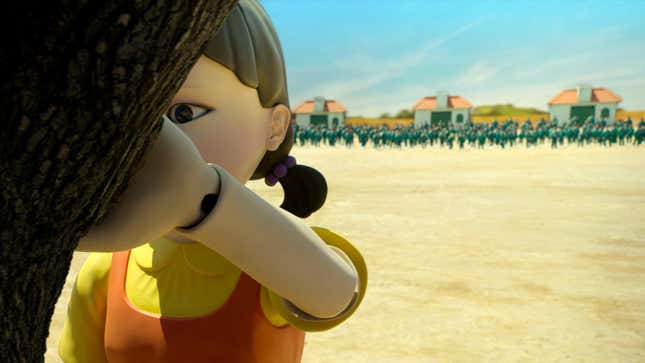
[Note: This article contains spoilers for the first and second episodes of new Netflix series Squid Game.]
Nobody in the world of Squid Game, the new Korean Netflix TV thriller from creator Hwang Dong-Hyuk, has ever seen Battle Royale, apparently. If they had—or read Stephen King’s The Long Walk, or any of a dozen other dystopian works where seemingly innocuous activities like school field trips are rendered horrifying by raising their stakes to absurdly lethal levels—they probably wouldn’t be half so surprised when snipers start gunning down the losers of the game of “Red Light, Green Light” they’ve all agreed to play, for a “handsome” cash prize, in the show’s first episode. Certainly viewers won’t be, even if they managed to skip the initial trailer that explicitly laid this familiar premise out.
But if you think you know exactly where Squid Game is going, it might behoove you to stick around through the show’s second episode, “Hell.” Picking up shortly after 250 or so of the games’ 456 participants have already been “eliminated” via high-caliber rifle fire, the episode—and the organizers of the game itself—waste little time in executing the show’s weirdest, most subversive, and just plain nastiest twist, one likely to catch both players, and viewers, off-guard. When people begin demanding to be let out, citing a “majority can vote to end the games” clause in the contracts they all signed before playing… it actually works. The masked organizers dutifully agree to live up to their “democratic” principles, bundle the survivors up, and send them back to the lives they were living before they all agreed to play the deadly games. No harm done. (Except for all the harm that’s already been done).
It’s a bizarre pacing choice, for a show that knows you likely tuned in to watch desperate people play hopscotch or marbles with a revolver pointed at their heads. After the surreal pastel visuals of the games complex, the outside world now feels drab, the mundanity of its problems tedious (if no less crushing). We signed up for a high-stakes, winner-takes-all action series, and now we’re suddenly dropped back into a series of domestic dramas about medical debt and family strife. Worse: It feels like marking time, since viewers know that the structure of the series demands that washed-up gambler Seong Gi-Hun (Lee Jung-Jae) and most of his fellow former players are inevitably going to take up the game organizers’ offer to resume the festivities just a few days after their narrow escape.
And that, of course, is the point—not just of “Hell,” but of Squid Game itself, which is a far more pointed social satire than it initially lets on. When the players of the show’s Games first arrive at their mysterious island prison, you could argue pretty strongly that they’d been tricked into wagering their lives, unaware of the most important terms of the agreements they all signed. When they return—and they almost all return—it’s because they’ve collectively decided that one of the women who loudly voted “No” on the “Should we leave?” question was actually right: The “Hell” of life on the fringes of an uncaring society, buried in debt, isn’t just as bad as the arbitrary children’s games they’ll be forced to play on the island. It’s worse, because at least when you’re playing “Red Light, Green Light” with a rifle pointed at your skull, you have a halfway decent chance of winning.
Throughout the show, the organizers of the games take pains, at every step, to emphasize what an egalitarian meritocracy they’ve created, one where no outside factors, no quirks of birth or privilege, matter in comparison to the simple ability to play children’s games well. No one was forced to be here, they remind the players at every point of friction. We gave you a chance, and a choice.
The cruelty of that system—and the ways that the games have been manipulated, at every step, to make participation the only “reasonable” option—are at the heart of Squid Game’s stridently anti-capitalist outlook, a worthy companion piece to that other deceptively leftist Korean import of recent memory. It’s what makes “Hell” so incredibly important to the show’s overarching goals, as every major character is funneled into the belief that there’s no way to thrive but to buy in and play the game. The organizers don’t even have to manipulate events to pull the players back into their orbit—they just wait for society to do its work. By the time we learn that Gi-hun’s defining trauma stems from participating in a labor strike that was lethally suppressed by state violence, it feels nearly superfluous: Squid Game has been show-don’t-telling its way through the entire capitalist playbook already by this point.
Because, no matter what the organizers of the games might try to tell their victims, the kids’ games that make up the Squid Game competition aren’t fair. They’re arbitrary; they’re cruel; they’re easy to cheat and manipulate. You wouldn’t play them if you didn’t have to—so convincing the characters that they not only need to, but want to, put their lives on their line to try to win them is the most vicious and important element of the trap they’re corralled into by the series. After all, the show’s villains remind them, over and over again: It’s the only game in town, right?